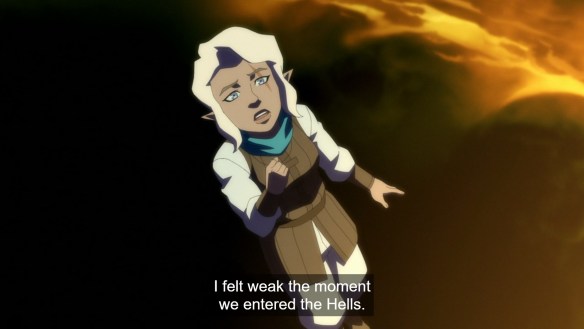Hello folks, and welcome back to Wrong Every Time. Today I’m eager to dive back into the rambling adventures of Vox Machina, wherein our heroes have currently divided their forces between fighting a dragon and infiltrating hell itself. Not normally a time when I’d recommend splitting the party, but given their impressive history of dragon-slaying, I’d imagine… what’s this? They’ve fought this dragon twice already, and it kicked their asses even as a full party? Yeah, they’re fucked.
Fortunately, seeing how a group of players and their DM can collaborate in getting themselves un-fucked from some seemingly unwinnable scenario is one of DnD’s greatest pleasures. Readers of traditional fiction will generally look poorly upon entirely foreshadowing-free deus ex machina, but it’s not hard to weave some complicating variable into your prior narrative such that a group’s fortunes can change from desperate to triumphant at a moment’s notice. In contrast, DnD prioritizes player agency above all, which means a solution that doesn’t emerge from skillful application of their player abilities is always going to be less satisfying than a victory that feels “mechanically earned.”
This issue only becomes all the more prominent as a campaign rises in scale over time, presenting ever-more intractable opposition for its brave heroes. The easiest solution to this riddle comes in the form of providing your enemy an Achilles’ Heel, or, in game parlance, a giant glowing weak point. An enemy’s strength can be utterly overwhelming so long as its weakness is also apparent – that way, there’s no need to limit your conception of an enemy’s power relative to your party’s available strength. And depending on the style of your campaign, these weaknesses can range from something as tangible as the Vestiges to simple overconfidence, so long as you provide the players opportunities to exploit that confidence. Given we’re pitting Vox Machina’s craftiest members against the Chroma Conclave’s dimmest dragon, I imagine some trickery will be involved in the task ahead, and I’m eager to see how Mercer realizes this chapter’s oversized threats without outright killing the party. Let’s get to it!
Episode 4
We open on Pike once again attempting to negotiate with the Everlight, which might again imply her player was absent for some period of time. Pike’s story has involved a whole lot of conversing directly with her god in order to maintain her powers, which in DnD terms is both kinda arbitrary drama and also party-averse, as it’s a style of conflict none of the others can meaningfully engage with. This makes me think it was a concession to her scheduling – Pike’s player often had to progress her drama purely through one-on-one discussions with Mercer, as she wasn’t available frequently enough for her drama to progress naturally through the group’s collective experiences. An awkward solution, but likely the best of several bad answers, as it’s certainly superior to just leaving her as a static character all season long (particularly when several other characters are already grappling with fear of either change or stagnation)
“Redemption does not exist in the realms of the damned. The Hells of Despath are forbidden.” Interesting words from the Everlight, drawing attention to the sort of fractured conception of the afterlife as presented by DnD’s default fantasy world. Different gods all have their own different eternal rewards, and if you aren’t aligned with some deity or other, the assumption is that your soul will basically sort of disintegrate over time. So it’s a combination of pagan polytheism with a variation on the nine hells clearly ripped from Dante, lacking in clear rules regarding how your actions on earth and eternal punishment or reward actually interact
This means faith in DnD is messy, but it also provides plenty of dramatic opportunities. In order to square this circle of all gods being technically real, but not necessarily possessing the authority you’d assume of a traditional god, I’ve taken to embracing the system of “faith generates divinity” – the more a god is actively worshiped, the more power they possess. As a result, gods have clear incentives to expand their power, and stories can naturally incorporate these incentives to drive their mortal drama. As my party’s characters drift through their late teen levels, they’re becoming an increasing concern to the deities, as groups of that power can actually gather faith in their wake
Regardless, the end result in this case is that the Everlight declares she has no power within the hells. I personally defined this separation more loosely – the gods couldn’t attack hell directly, but when my players were making their final assault on hell, the gods were able to provide blessings and brief appearances by key allies. Precisely the sort of “I’m not technically touching you” godly nonsense that makes Greek mythology so entertaining
We swiftly run through a series of deft athletic maneuvers that were presumably an actual challenge during tabletop play. Running through physical obstacle courses is a DnD staple that doesn’t translate particularly gracefully to TV drama
And then everyone gets a hellish makeover from Scanlan. Another DnD staple, and for good reason – playing dress-up with your invented characters is like half the fun of inventing them. I’m having a lot of fun with that in our currently ongoing campaign, as I accumulate a stable of outfits for my goblin Tilly
Keyleth deftly passes an intimidation check by noisily eating some passing hell-creature. A natural method of limiting the game’s reliance on arbitrary dice rolls over player actions is to emphasize that performance and quick thinking will always sweeten the pot – it’s easier to succeed in a persuasion check if you do something that actually seems persuasive, and so on
Ooh, love these full tableaus of hellish filth and violence. A very texture-rich interpretation of the underworld
Really appreciating Keyleth’s enthusiastic hell-voice performance. Lots of saliva, very convincing
Meanwhile, Vex is blasting our other party free of their ice tomb. She and Percy can’t help but riff as Allura rushes out seeking Kima – a contrast in tone that seems almost unavoidable in DnD. The DM will always be playing something of the straight man relative to the party members, offering alternately stoic or passionate NPCs who must naturally be somewhat accommodating of a jocular adventuring party’s sense of humor. The world exists for the players, and joking means they’re having a good time – accommodating that sense of camaraderie necessitates ignoring (or at least downplaying) whatever offense such a tone might prompt among the NPCs of their world
The evil of hell is like a physical weight upon Pike. According to the standard DnD rules, good and evil are tangible, elemental things you can actually sense via magic – however, such a static, mechanical conception of morality feels like plain bad writing to me, and so I generally steer away from invoking such devices
Pike attempts to help a damned soul, which only gets it screaming so loud it disrupts Scanlan’s concentration on their disguises. Time for another chase sequence!
Chase sequences are tricky in DnD for several reasons. For one, combat or any other active actions are turn-based – how much you can move in a given round is a direct result of your characters’ written movement speed, meaning you have to break the symmetry of that system in some way simply to convey the idea of characters moving faster or more creatively across a given stretch of terrain. For another, these turn-based sequences are generally conceived as taking place within a set arena – in order to create the terrain necessary for an ongoing chase, you have to stretch the game’s natural conception of active conflict, constructing a larger and more complex map for the characters to traverse. These issues aren’t unresolvable, but they do make chase sequences particularly labor-intensive on the DM’s side, necessitating a lot of additional prep work
They are ultimately saved by the devil Zerxus himself, who leads them to his sanctuary
He offers them the vestige if they can best him in a game of chance. Classic devil stuff, and DnD provides a number of dice-based simulated card games. I’m partial to actually just running a round of five card draw myself; as long as your players know the basic rules of poker, it’s hard to beat the familiar drama and tactile sensation of cards in your hands. Every prop you can include as DM helps bolster the substance of your world, whether it’s a set of cards, a slideshow of scenery on a monitor, a unique monster figure, or simply appropriate scene-setting music
Pike wagers her life against the vestige, sealed with a contract. Devilish contracts feel like one of the few genuine successes of DnD’s alignment system – we have culturally accepted that devils love contracts, and thus DnD devils are designed as the epitome of “lawful evil,” evil bound by every bureaucratic flourish you could imagine
The game they’re playing is “Five Skulls,” which seems to be a mixture of Guess Who? and Battleship – players must discover their opponent’s black skull out of five total face-down cards, asking questions to guide their search
Of course, the game is actually a psychological gambit to weaken Pike’s will, as he’s fully aware her physical tells will reveal her card’s location. Designing gambits like this demand failsafes – it’s excellent that Pike can actually fail here, but you can’t just leave your players with no exit strategy
Here, the failure serves only to ratchet up the tension, as it is now all of her friends’ lives that are on the line
Granted, the significance of failure is relative in DnD, depending largely on your player group’s stomach for it. For on-book adventures like Curse of Strahd, DnD can appear much like a GTA rampage in a fantasy sandbox, and players who like it that way are also likely not to take offense at being asked to roll a new character. But if you’re trying to collectively craft a long-form fantasy epic, character death is generally something to be handled carefully
“Have you ever wondered if the Everlight needs you more than you need her?” A delicious question to ask a faith-driven character, and one I’ve been actively toying with while crafting post-campaign quests for my own party. The villain of my campaign exploited the tangible power of faith within DnD in order to create a sort of factory, where acolytes were sacrificed to create magical energy. Faith isn’t good or evil, it is simply power – and now, with the party essentially serving as champions of the gods, the question of whether they are more threat than benefit to their patrons is coming into focus
“Do you ever wonder if your life would be better without the Everlight?” The true game here is not divining the correct card, it is asking questions your opponent cannot truthfully answer, thus forcing them to take penalties. A delicious and extremely devilish game design – I’ll be happy to poach this one if an appropriate situation presents itself
And in response, Pike also takes her focus off the cards in front of her, asking Zerxus who he used to be, and why he chose her. A very appropriate choice – the core of goodness is not righteous self-assurance, but simple empathy
Zerxus explains he was actually among the adventuring party that prompted the Calamity, as his faith in his friends blinded him to the danger they posed
Nice visual flourishes for this sequence, presenting Zerxus’ history in stained glass windows
“There is no difference between the gods above or below. They all lie.” This Zerxus is making some good points
“Do you wish your family was here?” Pike’s final question challenges the basis of his current philosophy, whether there was honor in his choice, or simply self-interest. A graceful tethering of his knightly and devilish identities
“Well played. That was more devious than I expected.” That’s the fun thing about devils – the best of them respect good game, even if they’re on the losing end. It makes them well-suited for roles as former adversaries who now possess some degree of respect for the players
Honestly, there are plenty of ways Pike’s question could have failed to provoke a useful response, but that’s the work of the DM – if the player puts in good work, their effort should be rewarded. You’re not trying to “defeat” the players, you’re trying to build something that is greater for all of your collective contributions
Zerxus graciously offers them his talisman as well, allowing passage through Despath. He might be a devil, but he’s not a monster
Aaand then he sics his bodyguard on them. Well then
And Done
Excellent work, brave heroes! And a rare spotlight episode for Pike Trickfoot, whose variable availability has often left her somewhat underserved relative to her teammates. Pike did excellent work in this episode, rising to a challenge between good and evil that demanded keen emotional investment in the tale of her devilish opponent. I’m quite intrigued by Mercer seemingly drawing the inconstancy of the gods into his active drama, clearly pointing to a threat that lies beyond the Chroma Conclave. Great, expansive fantasy stories tend not to take their conceptual origins for granted; the Calamity is clearly the largest defining event for this world, and Mercer seemingly has designs in mind for allowing Vox Machina to serve as a bookend for that event, resolving whatever wound is still left upon the earth. I’m eager to see how he manages it, and also pretty sure I’m gonna steal that Five Skulls game. Our productive foraging continues!
This article was made possible by reader support. Thank you all for all that you do.



